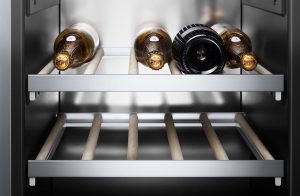Temperature
Displaying 1 - 1 of 0 Articles
Categories
-
September 24, 2018
Top Tips for Storing Your Wine
Most of us enjoy a glass of wine to relax after a tough day, but if you start to become a real wine lover, you’ll need to ensure that you store your bottles properly. Improperly stored wine can suffer from oxidation and lose some of that bouquet and body. So, here we have some top tips to help you store your wine like a PRO. Understand the Proper Storage Temperatures If you have a bottle of cheap white, it is easy to pop it in the refrigerator, but serious wine lovers need to understand the proper storage temperatures. The temperature can dramatically affect the smell and taste of your wine, and if you want to keep those spicy, fruity aromas, when you pour a glass, you need to understand the correct storage temperatures. Generally, sweet wines should be stored at 42ºf for whites, and Rose’ at 50ºf while Reds at 54ºf. These are a good guideline for most wines, but some others require a little more care. For example, Champagne should be stored at 46ºf, while Port should be kept at 60ºf. For the optimal serving temperatures, you should not allow your wine to hit temperatures above 55ºf for whites and 68ºf for reds. Consider Humidity While the proper temperature is critical, you also need to consider the humidity levels. The correct humidity is tied directly to the wine corks, particularly in long-term storage. If the humidity is too low, your wine corks can dry out; compromising the seal and![Gaggenau beauty shot Gaggenau beauty shot]()
-
July 25, 2016
Grillin' Time in SouCal
New Gas Grills From DCS in 2016Local Favorite DCS Grills Featured at UAKCMakes sense that the high quality DCS grills are best sellers in SouCal, they've been in this market forever, and they're made right here. To be clear, DCS is now part of a much bigger company and sold across the country and internationally. Nevertheless, the grills that made them famous are still here and still a favorite among our friends and customers at UAKC. Let's take a look at the DCS features and benefits in 2016:The new release 2016 DCS Grill Series raises performance to a new level. DCS is renowned for its no-nonsense professional grilling performance, durability and best in class warranty.Now add to that an addition of a temperature gauge allowing the monitoring of internal heat, along with the introduction of the our ultimate performance grills, available in 36" and 48" Grills two new model variations in the 36" and 48" Grills, making the 2016 DCS Grill Series the best kitchen solution to your outdoor experience.What Makes DCS UniqueTemperature Gauge - Zero to searFull surface searing Precision heat and controlRotisserie made easyReal steel - inside and outLifetime Warranty PromotionsPurchase any qualifying DCS 36" or 48" Grill and matching cart and receive up to $450 worth of accessories. Promotion runs between June 24, 2016 - September 06, 2016Purchase A DCS 36" Or 48" Grill Head & Any Outdoor Storage Product To Receive A Free Built In Sideburner Or 20" Storage Drawer. Promotions runs between Promotion runs between March 01,![Photo-20160319162128652.jpg Photo-20160319162128652.jpg]()
-
March 04, 2015
How Your Dishwasher Works
3 Ways Dishwashers Get Your Dishes CleanThere are three processes that contribute to your dishwasher getting your dishes clean. They are: Mechanical, Thermal, and Chemical actions. These processes work together to assure you the best possible cleaning results that will make your dishes shine.MechanicalThe motor and pump of the dishwasher force water through the holes in the spinning spray arms, creating powerful streams of water that peel stuck on food particles from your bowls, dishes, glasses, pots, pans, and silverware. Dishwasher insulation, and quiet, smooth-running motors and pumps enable your dishwasher to powerfully scrub your dishes with a minimum of noise.ThermalDepending on the cycle selected, water is heated to 120-140 degrees (even more for a sani-cycle). Hot water not only breaks down the detergent (see below), it also helps loosen and remove food particles from the dishes, and carries the debris through a filter and down the drain. During the rinse cycle, fresh, clean water leaves your dishes sparkling. If selected, an NSF sanitizing cycle adds more heat; 155-160 degrees for a prescribed time. A drying cycle, usually heat assisted, finishes the job. ChemicalDetergent, and rinse agent are released into the dishwasher at the proper times in the wash or rinse cycles to mix with the hot water. The hot water and detergent mix together enabling the water to "scrub" stuck on food particles from the dishes, glasses, and silverware. In addition, the detergent helps suspend the dirt in the water so that it does not redeposit on the dishes,
Displaying 1 - 1 of 0 Articles



